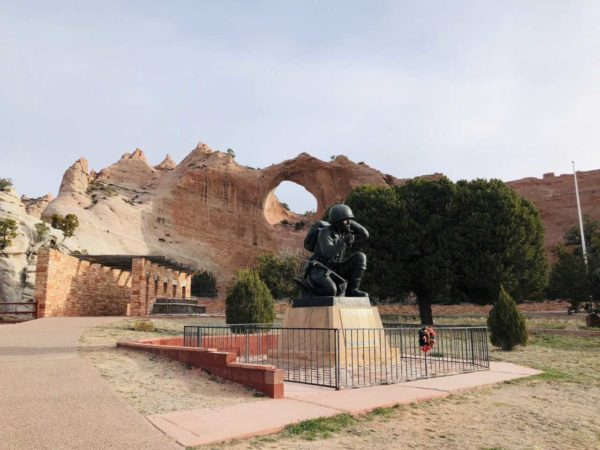
- Details
- By Native News Online Staff
WINDOW ROCK, Ariz. — Navajo Nation President Jonathan Nez and Vice President Myron Lizer commend the 24th Navajo Nation Council’s Health, Education, and Human Services Committee for their approval of legislation that will allow the Navajo Nation Veterans Administration to develop new internal policies to make the financial assistance process more efficient and easier for Navajo veterans across the Navajo Nation.
Navajo Nation Veterans Administration Executive Director James D. Zwierlein presented the legislation to the committee on Wednesday in Window Rock, Arizona.
“Since coming on board as the executive director for the Navajo Veterans Administration, Mr. Zwierlein has focused on improving policies to help our veterans. This legislation creates a path for the Veterans Administration to change financial assistance procedures and to make it available at the agency level,” stated President Nez. “We are very thankful for the support of the Health, Education, and Human Services Committee. The Navajo people want us to work together to reduce and eliminate red tape and to restructure internal processes and that’s what we did with this legislation.”
Legislation No. 0375-19 sponsored by Council Delegate Paul Begay, amends the financial assistance policy for the Navajo Nation Veterans Trust Fund by removing language that often led to setbacks in obtaining financial assistance for veterans. Director Zwierlein said his office will now be able to revise the procedures to better streamline the process and make it more flexible, efficient, and accessible at the agency level.
The Navajo Nation Veterans Trust Fund was established in 1998 to provide funds for veterans programs, projects, services, and activities which include but are not limited to program/project development, community/economic development, housing, training, and employment opportunities, leveraging or matching funds for exemplary projects, protection and advocacy services, benefits-related services, education and scholarships, and survivor’s benefits for surviving spouses of deceased veterans.
“When we campaigned, one of the primary concerns raised by Navajo veterans was the processing of their financial assistance. With today’s action by the committee, we are pleased to take another step in the right direction to resolve deficiencies and improve the system. We also thank Council Delegate Paul Begay for sponsoring the legislation,” said Vice President Lizer.
President Nez and Vice President Lizer also tasked Director Zwierlein with making changes to other policies that address veterans housing and other needs and with implementing housing manufacturing facilities on the Navajo Nation to construct and deliver homes for Navajo veterans and others.
On Wednesday, the Health, Education, and Human Services Committee approved the legislation by a vote of 5-0 and serves as the final authority for the bill. The Nez-Lizer Administration looks forward to continuing to work together with the committee and the entire Council to improve more policies within the Veterans Administration that benefit the Navajo veterans.
More Stories Like This
Native News Weekly (August 25, 2024): D.C. BriefsNavajo Nation Mourns the Passing of Former Vice President Rex Lee Jim
Deb Haaland Earns Endorsement From Communications Workers of America Local 7076
University Soccer Standout Leads by Example
Two Native Americans Named to Democratic Congressional Campaign Committee's“Red to Blue” Program
Help us defend tribal sovereignty.
At Native News Online, our mission is rooted in telling the stories that strengthen sovereignty and uplift Indigenous voices — not just at year’s end, but every single day.
Because of your generosity last year, we were able to keep our reporters on the ground in tribal communities, at national gatherings and in the halls of Congress — covering the issues that matter most to Indian Country: sovereignty, culture, education, health and economic opportunity.
That support sustained us through a tough year in 2025. Now, as we look to the year ahead, we need your help right now to ensure warrior journalism remains strong — reporting that defends tribal sovereignty, amplifies Native truth, and holds power accountable.
 The stakes couldn't be higher. Your support keeps Native voices heard, Native stories told and Native sovereignty defended.
The stakes couldn't be higher. Your support keeps Native voices heard, Native stories told and Native sovereignty defended.
Stand with Warrior Journalism today.
Levi Rickert (Potawatomi), Editor & Publisher

